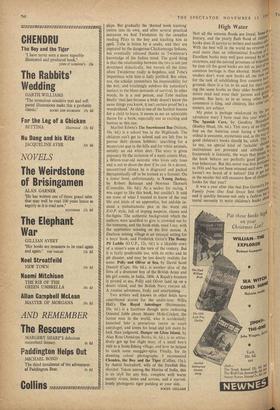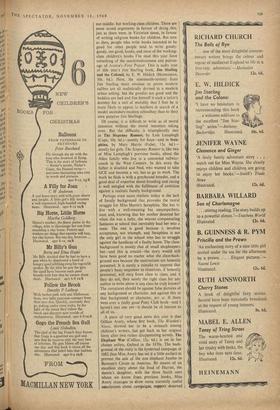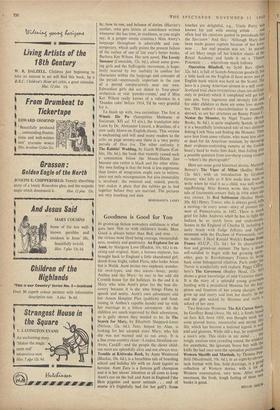High Water NOT all the autumn floods are literal. Soinel irl , 1
literary, and the yearly flash flood of child books does ill service to writers and readers 01 With the best will in the world no reviewer ca, read more than an infinitesimal fraction 01111.t Excellent books may well pass unread by all !ni reviewers, and the normal processes of winno,,1"to by time till the good books are left as part 01 'ne common heritage is thus aborted. More, Pli:;:j readers don't want new books all the tinte 31;, for the task of establishing firm common h3cd, grounds there is a lot to be said for their re:011 ing the same books as their older brothers "d, , sisters read and even their parents and grainds, parents. But here, as in so many other fie'0,. commerce is king, and children, like other c° sumers, are subject. My point is perhaps reinforced by the hbesi: adventure story I have read this year watch The Spanish Cave, by Geoffrey I-100',;ch (Bodley Head, 10s. 6d.). This story of an Engles boy on the Asturian coast facing a territYll ordeal is awesome, mysterious and, in the waYais good children's books should be, adult. Thia', to say, no special kind of 'suitable' elliwAti'he motivations are provided and although 'in framework is fantastic, the ways that people to the book behave are perfectly good guiclifs true behaviour. But this novel was first pubilhy in 1936 and has not been reissued until now lost haven't we heard of it before? Did it get, in the smaller but still excessive flow of books for that year? , The It was a year after this that Eve Garnett 's Family from One End Street first apPeare, and it quickly became not only a fashion hihut moral necessity to write children's books ab° not middle- but working-class children. There are some sound arguments in favour of doing this, just as there were, in Victorian times, in favour of writing religious books for children. But now as then, people who write books intended to be good for other people tend to write goody- goody, not good, books, and most of the working- class children's books I've read this year have something of the sanctimoniousness and patron- age of Jessica's First Prayer. This is sadly true of this year's Jim Starling book, Jim Starling and the Colonel, by E. W. Hildick (Heinemann, 10s. 6d.). Here, the nineteenth-century feats Jim Starling must emulate to prove modern calibre are all realistically devised in a modern urban setting; but the goodies are good and the baddies are bad and Jim himself is such a tailor's dummy for a suit of morality that I fear he is more likely to appeal to teachers in search of a model secondary-modern schoolboy than to their own putative Jim Starlings.
Of course, it is difficult to write as of moral intention without the moral intention taking over. But the difficulty is triumphantly met in The Sixpenny Runner, by Lois Lamplugh (Cape, 10s. 6d.)—mostly for boys—and in Sera- phina, by Mary Harris (Faber, 13s. 6d.)— mostly for girls. The Sixpenny Runner is, like two of Miss Lamplugh's previous books, about the Allen family who live in a converted railway- coach in the West Country. In this story the father is disabled and Ned, who wanted to take GCE and become a vet, has to go to work. The work he finds is with a greyhound breeder, and a good deal of expertise about breeding and racing is well mingled with the fulfilment of ambition against a realistic family background.
Perhaps even more realistic today is the lack of family background that provides the moral struggle for Miss Harris's Seraphina. She has to live with a well-meaning but unsympathetic aunt and, knowing that her mother deserted her when she was a baby, she weaves compensating fantasies at school that inevitably lead her into d mess. The end is good because it involves acceptance, not triumph, and Seraphina is not the only girl in the school who has to struggle against the handicap of a faulty home. The class- background is mostly that of small shopkeepers but—and this is crucial—the story would still have been good no matter what the class-back- ground was because the motivations are honestly presented. It is surely a mistake to suppose that people's basic responses to situations, if honestly presented, will vary from class to class, and :f they do not, then surely the right class for any author to write about is any class he truly knows? The complaint should be against false pictures of any background or character, not against this or that background or character, per se. If there were ever a really good Pony Club book—and I haven't met one yet—it should be of interest to all of us.
A piece of very good news this year is that Gillian Avery, whose first book, The Warden's Niece, showed her to be a nonsuch among children's writers, has got back to her original form after two rather disappointing novels. The Elephant War (Collins, 12s. 6d.) is set in her chosen milieu, Oxford in the 1870s. The back- ground of the story is the hysterical campaign of 1882 (but Miss Avery has set it a little earlier) to prevent the sale of the zoo elephant Jumbo to Barnum's Circus in America. By means of an excellent story about the feud of Harriet, the doctor's daughter, with the three Smith sons whom we know from previous books, Miss Avery manages to draw some currently useful conclusions about campaigns, support deserved by, how to run, and balance of duties. (Harriet's mother, who gets letters of condolence written whenever she has time, in readiness, as you might say, is a proper comic creation.) Miss Avery's language throughout is admirable and con- temporary, which sadly points the present failure of the author of one of last year's better books, Barbara Ker Wilson. Her new novel, The Lovely Summer (Constable, 12s. 6d.), about some grow- ing girls and the Suffragette movement, is hope- lessly marred by her inability to confine her characters within the language and concepts of the period—enormously important in the case of a period comparatively near our own. Edwardian girls did not dance to 'four-piece' orchestras or visit 'powder-rooms,' and if Miss Ker Wilson really knows of a reference to a 'Dundee cake' before 1914, I'd be very grateful for it.
To finish up with, two curiosities: The first is Winnie Ille Tu (Sumptibus Methueni et Sociorum, XII sot. VI din.), the translation into Latin by Dr. Alexander Lenard, a Brazilian, of a now sadly blown-on English classic. This version is enchanting and will send many readers to the crib; on page seventy-one there is a very pretty parody of Dies Ira. The other curiosity is The Rabbits' Wedding, by Garth Williams (Col- lins, 10s. 6d.), the book that recently caused such a commotion below the Mason-Dixon line because one rabbit is black and the other white. My own feeling is that the book is less ingenuous than lovers of integration might care to believe, since not only miscegenation but also immorality is involved : the minimal and, indeed, puerile text makes it plain that the rabbits go to bed together before they are married. The pictures are very touching and nice.
MARGHANITA LASKI
















































 Previous page
Previous page